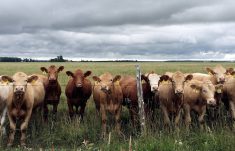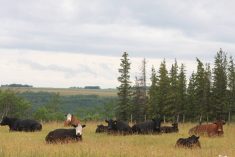Canadian farmers could soon be swept up in a looming taxation crackdown.
The Trudeau government has promised to lower the boom on what it characterizes as the abuse of private corporations by high-income individuals to avoid taxation.
Doctors have been especially vocal in their condemnation of the move, saying they have forgone fee increases in negotiations with provincial governments in exchange for the right to incorporate and lower their tax burden.
Now they’re decrying that what one level of government gave, another took away. With somewhere around two-thirds of Canadian doctors incorporated, it promises to fundamentally alter the economic reality of many doctors.
Read Also

Canadian agriculture has to back up diverse trade if it wants it
Cheap and easy access to U.S. trade is a relic of the past and market diversification is expensive: What’s Canadian agriculture to do?
Lost in the busy summer season, however, has been the potential impact on farmers — about one-quarter of farms are incorporated. Edmonton-based accountant Allan Sawiak, of Kingston Ross Pasnak LLP, has been sounding the alarm in a recent letter to clients and farm groups.
In the document, Sawiak notes what he describes as “shocking” changes that will affect various strategies an increasing number of farms use to manage their tax burden.
- Read more on Country Guide: Incorporation pushes farms into higher gear
There’s “income sprinkling” which sees a corporation gain revenue, rather than an individual, and then splitting that income among family members in the form of salary or dividends, which serves to lower the overall tax bite.
The government says that in the future these payments will only be valid if family members are shown to have earned it either through their labour or through capital investments in the corporation. In particular, they’ve said they’ll be watching very closely payments made to children between the ages of 18 and 24.
So-called ‘passive investments’ are also under the gun, which refers to making investments in stocks and bonds through a business, rather than individually, and therefore paying a lower tax rate in the end.
The feds also say they’ll be cracking down on the use of the lifetime capital gains exemption, which shelters more than $835,000 of capital gains in qualifying small-business shares. Currently business people and their financial advisers are able to use the exemptions of many family members to protect capital gains from taxation. Once again, younger family members seem to be the target of the proposed changes.
Sawiak also notes that a proposed grace period for capital gains exemption may provide some relief, but will also create issues of its own, including boosting the amount of tax paid under the ‘alternative minimum tax’ system.
Perhaps most troubling for farmers is that the government appears to be proposing to crack down on the very concept of incorporating a small business like a farm. The federal government is proposing a crackdown on transactions that would prevent any transaction that creates income at a lower tax rate. Sawiak notes in his letter to clients that the proposals “… are broad enough that they could apply to common situations like selling farm assets to a corporation.”
It’s clear, according to financial professionals, that these changes aren’t small potatoes. They’re a fundamental alteration in the way that professionals and small business owners can use incorporation to manage their affairs.
Alan Acton, an Ontario-based financial adviser to doctors and finance columnist, recently noted the proposals fundamentally call into question whether there will be any benefit in the future to incorporation.
That would seem to dovetail nicely with the government’s goal and may placate some who feel the wealthy are given tax advantages that most Canadians cannot access. But it’s a simplistic analysis of the situation.
The truth is most of the people setting up a corporation are operating in a far different environment than most salaried and hourly employees.
They’re taking more risk. They’re funding more for themselves, such as retirement saving and other benefits like medical care. They therefore claim they need the structure of incorporation to do so.
Critics of the move warn of the risk of pushing out well-trained and mobile professionals and the chilling effect on entrepreneurship. They also note many of the affected may simply close up shop and move — something that’s not an option for a farmer.
For farmers perhaps the greatest risk is that the proposed changes now throw a lot of doubt on succession plans set up under the old rules. Many of these will now need to be revisited and perhaps revised.
The changes are set for this fall and farmers need to understand them, respond to government, and make sure their financial houses are in order.
The government is currently seeking input up until an Oct. 2 deadline.
While the timing is terrible, this might be important enough to park the combine long enough to write a letter.
















